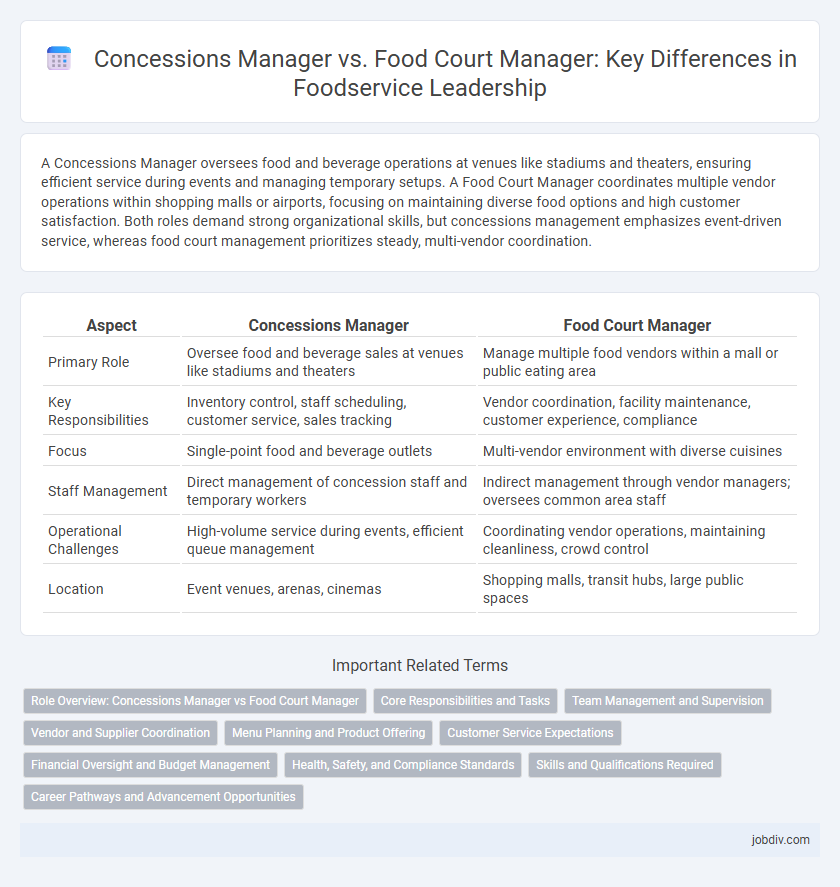A Concessions Manager oversees food and beverage operations at venues like stadiums and theaters, ensuring efficient service during events and managing temporary setups. A Food Court Manager coordinates multiple vendor operations within shopping malls or airports, focusing on maintaining diverse food options and high customer satisfaction. Both roles demand strong organizational skills, but concessions management emphasizes event-driven service, whereas food court management prioritizes steady, multi-vendor coordination.
Table of Comparison
| Aspect | Concessions Manager | Food Court Manager |
|---|---|---|
| Primary Role | Oversee food and beverage sales at venues like stadiums and theaters | Manage multiple food vendors within a mall or public eating area |
| Key Responsibilities | Inventory control, staff scheduling, customer service, sales tracking | Vendor coordination, facility maintenance, customer experience, compliance |
| Focus | Single-point food and beverage outlets | Multi-vendor environment with diverse cuisines |
| Staff Management | Direct management of concession staff and temporary workers | Indirect management through vendor managers; oversees common area staff |
| Operational Challenges | High-volume service during events, efficient queue management | Coordinating vendor operations, maintaining cleanliness, crowd control |
| Location | Event venues, arenas, cinemas | Shopping malls, transit hubs, large public spaces |
Role Overview: Concessions Manager vs Food Court Manager
A Concessions Manager oversees snack and beverage operations at venues like stadiums or theaters, focusing on quick service, inventory control, and vendor coordination to maximize sales during events. A Food Court Manager directs multiple food outlets within a retail or mall setting, ensuring smooth day-to-day operations, staff management, and customer satisfaction across diverse cuisines. Both roles require strong leadership and operational skills but differ in environment, scale, and customer interaction dynamics.
Core Responsibilities and Tasks
Concessions Managers oversee operations in venues like stadiums and theaters, managing inventory, staffing, and customer service to maximize sales during events. Food Court Managers coordinate multiple food vendors within shopping centers, ensuring smooth workflow, compliance with health regulations, and consistent food quality. Both roles require strong leadership, budget management, and customer satisfaction focus but differ in the scale and variety of food service environments.
Team Management and Supervision
A Concessions Manager focuses on overseeing food and beverage operations typically in stadiums, theaters, or event venues, requiring efficient management of part-time and seasonal staff during peak event times. In contrast, a Food Court Manager supervises multiple diverse food vendors within a shopping mall or large complex, coordinating between various teams to ensure consistent service quality and compliance with health regulations. Both roles demand strong leadership, but Concessions Managers emphasize rapid team mobilization and turnover, while Food Court Managers prioritize ongoing vendor and staff collaboration for daily operations.
Vendor and Supplier Coordination
Concessions Managers specialize in coordinating with vendors and suppliers to ensure timely delivery of bulk products tailored for event-based sales, emphasizing rapid inventory turnover and on-site stock management. Food Court Managers work closely with a diverse range of suppliers to maintain consistent supply chains across multiple food outlets, optimizing vendor relationships for varied menus and steady daily demand. Both roles require strategic vendor negotiation skills but differ in scale and frequency of supply coordination based on the operational environment.
Menu Planning and Product Offering
Concessions Managers focus on creating streamlined, high-demand menus tailored to quick service and impulse purchases, often emphasizing portable, single-serve items suitable for venues like stadiums and theaters. Food Court Managers oversee diverse food vendors, coordinating varied cuisines and ensuring menu offerings cater to broad customer preferences and dietary needs within shared dining spaces. Both roles require strategic menu planning, but concessions prioritize efficiency and speed while food court management balances variety and customer satisfaction.
Customer Service Expectations
Concessions Managers prioritize fast, efficient service with a focus on high-volume sales and timely product availability, ensuring customers receive quick and accurate orders during events. Food Court Managers emphasize diverse food options and ambiance, managing multiple vendors to deliver consistent quality and personalized customer experiences. Both roles require strong communication skills to handle customer inquiries and maintain satisfaction in dynamic environments.
Financial Oversight and Budget Management
Concessions Managers concentrate on maximizing revenue through efficient pricing strategies and cost control across multiple point-of-sale locations within entertainment venues. Food Court Managers oversee broader budget management, including vendor negotiations, inventory procurement, and labor cost optimization across diverse food outlets in shopping centers. Both roles require detailed financial analysis and forecasting to ensure profitability while maintaining quality and customer satisfaction.
Health, Safety, and Compliance Standards
A Concessions Manager ensures strict adherence to health and safety protocols in fast-paced environments such as stadiums and event venues, focusing on rapid service while maintaining food safety standards. In contrast, a Food Court Manager oversees multiple dining outlets, emphasizing comprehensive compliance with sanitation regulations and operational consistency across diverse vendors. Both roles prioritize rigorous staff training and regular inspections to uphold compliance with local health codes and minimize foodborne risks.
Skills and Qualifications Required
Concessions Managers require strong inventory management and cash handling skills, along with the ability to manage fast-paced, high-volume environments often found in stadiums or events. Food Court Managers must possess expertise in vendor coordination, customer service excellence, and compliance with health and safety regulations across multiple food outlets. Both roles demand leadership capabilities, proficiency in scheduling, and experience with point-of-sale systems to ensure operational efficiency.
Career Pathways and Advancement Opportunities
Concessions Managers typically start in entry-level roles within event venues or stadiums, advancing by honing skill sets in large-scale, fast-paced food operations and vendor coordination, while Food Court Managers often progress through retail or hospitality backgrounds, focusing on multi-unit supervision and customer experience optimization. Career pathways for Concessions Managers emphasize contract negotiation and inventory management, positioning them for regional or operations management roles, whereas Food Court Managers develop expertise in franchise management and tenant relations, leading to district or corporate management positions. Advancement opportunities for both roles depend on leadership capabilities and operational success, with industry certifications and specialized food safety training enhancing promotion potential.
Concessions Manager vs Food Court Manager Infographic

 jobdiv.com
jobdiv.com